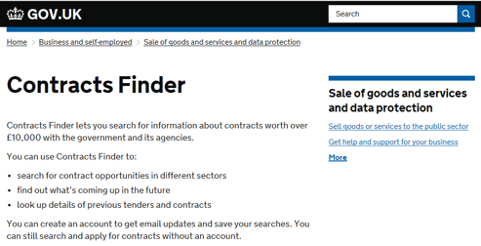Samuel Johnston, CMO at BookingLive, shares tips on how SME’s can bid on and secure government contracts in a time when innovation is crucial in the public sector
Working with the government can be lucrative for SMEs. The public sector spends more on contracts than on providing services itself. In 2014-15, the figure spent on procurement was a hefty £242 billion.
The government’s policy is to award contracts as often as possible to smaller businesses and has stated an aim to reach 33% of all procurement going to SMEs by 2022. With that aim in mind, there have been a few recent changes to help smaller firms bid on public sector contracts:
- All available tenders now get published on the Contracts Finder portal
- The entire public sector supply chain must get paid within 30 days
- Procurement processes are more straightforward and more transparent than ever before.
Securing government contracts still isn’t easy for an SME, however. Any business looking to move into the public sector needs all the help they can get. There’s no one sure-fire tactic for winning public sector contracts but here are five tips to help you with the process.
Be proactive when seeking opportunities
All opportunities to tender for contracts must be publicly advertised and are shared via the Contracts Finder portal. It would help if you didn’t wait around for new opportunities to appear there, though.
There are several ways that you can be more proactive in seeking chances to tender for contracts:
- Attend local information days or public meetings. These events will often be where authorities and other organisations discuss future projects
- Register your interest in future procurements. There are lots of sites and portals designed for companies to do this
- Sign up for email alerts on the Contracts Finder portal.
This kind of proactive approach is called ‘pre-market’ engagement. It’s how you can get involved in the procurement process before a contract officially goes out to tender. That way, you may even get to influence the nature of the formal tender process.
Source: LGSS
Play to your strengths, and be realistic
A scattergun approach isn’t the best way to win government contracts. You can’t tender for every opportunity that arises and hope that you win one. Instead, be realistic about your firm’s stature. Make sure you focus on the tenders you have a genuine chance of winning.
If you’re new to public sector tendering, it’s best to first look at opportunities worth less than £100,000. That’s the threshold under which you don’t have to complete Pre-Qualification Questionnaires (PQQ). Those questionnaires remove many firms from the tendering process at the preliminary stage.
When you bid for a contract, make sure to play to your strengths as an SME. The government likes to work with smaller firms as they can often offer better value and flexibility over big corporations. Don’t shy away from highlighting these strengths by pretending to be larger than you are. That’s a common mistake that many small business’ make.
Understand the procurement process
Before tendering for any contract, you’ll want to know the procurement process inside out. This is the route by which the tender is going to get awarded. The authority advertising the contract will share all the details of the process at the outset.
Only by understanding how a tender is going to get awarded, can you give your company the best chance of getting it. Each procurement process differs according to the details of the contract. The following, though, are the three main steps that most follow:
- Advertisement – an authority publishes the details of an upcoming tender. These details will include any eligibility criteria and what a firm must do to bid.
- Tendering and selection – businesses bid on the available contract. The relevant authority then assesses the various bids. This part of the process is where PQQs may come into play.
- Award – each tender gets weighed according to various contract-specific criteria. The company that submitted the most viable bid becomes the preferred bidder. That company gets sent a legally binding acceptance letter and then signs a formal contract.
Build an accurate, professional bid
Once you’ve identified an opportunity, it’s time to build your bid. By examining the procurement process, you’ll know what you need to do. Make sure you follow the available advice to the letter.
A bid should comprise of a selection of documents outlining your company’s plan to fulfil the available contract. Things that you should feature in your tender include:
- A summary of your company’s track record in delivering the kind of service required.
- An explanation of your USP. What is the one solution that your company can offer that no one else can?
- The price you’re quoting to fulfil the contract. What pricing strategy have you adopted, and how does it represent value?
- A SWOT analysis to display the depth of your understanding of contract requirements.
- As much evidence as possible to back up all other elements of your bid.
Source: SAP
Post-bid advice
You’re not likely to succeed with your very first public sector tender. It can happen, but more often than not, you’ll need to deal with some rejections. If you get turned down a few times, the best advice is to keep trying. Look back on your failed bids and identify places where you can improve in the future.
If you feel a tendering process hasn’t been handled fairly, you can take action. The Public Procurement Review Service exists to challenge unfair practice. By contacting them, you can encourage the government to investigate any potential wrongdoing.
SMEs and public sector contracts
If public sector contracts go to SMEs, it’s a win-win for everyone. The government often gets better value and can support an essential part of the economy. Smaller businesses, meanwhile, open a lucrative new avenue for ongoing work. They also get a boost in public profile from providing a service to the government.
For those reasons, securing work from the government isn’t easy. Every tender that goes to market gets lots of interest. By following the tips discussed then you’ll be able to identify the right opportunities for your company, produce a winning bid to give you the best chance of landing a transformative public sector contract.







![Europe’s housing crisis: A fundamental social right under pressure Run-down appartment building in southeast Europe set before a moody evening sky. High dynamic range photo. Please see my related collections... [url=search/lightbox/7431206][img]http://i161.photobucket.com/albums/t218/dave9296/Lightbox_Vetta.jpg[/img][/url]](https://www.openaccessgovernment.org/wp-content/uploads/2025/04/iStock-108309610-218x150.jpg)





